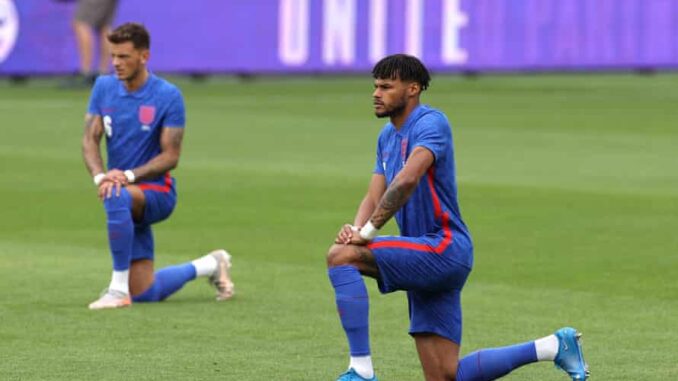
Boris Johnson has said he wants the “whole country” to get behind the England team but has refused to condemn those who booed players taking a knee, as a row over the anti-racism gesture threatens to overshadow the start of Euro 2020.
With a slew of Conservative MPs and right-wing commentators stirring up further controversy, fan groups called on those who jeered before two recent friendlies to stop. England play their opening Group D fixture against Croatia on Sunday.

Asked about the booing before England’s match against Romania at the Riverside on Sunday, the prime minister’s official spokesman seemed to offer support to both sides of an increasingly heated argument.
The prime minister “fully respects the right of those who choose to peacefully protest and make their feelings known”, the spokesman said, adding: “On taking the knee, specifically, the prime minister is more focused on action rather than gestures. We have taken action with things like the Commission on Racial and Ethnic Disparities and that’s what he’s focused on delivering.”
The Commission on Racial and Ethnic Disparities was widely criticised by experts for a selective use of evidence and concluding there was no evidence of institutional racism in the UK.
On the subject of the team the spokesman struck a different note, however. “The PM is supporting the England football team and wants them to succeed and wants the whole country to get behind them in that endeavour,” he said.
Gareth Southgate has confirmed his players will take the knee on Sunday and throughout the tournament. “It’s not going to stop what we’re doing and what we believe. It’s not going to stop my support for our players and staff,” he said on Sunday – and that they will answer no further questions on the subject.
That may prove difficult should there be more booing at Wembley against Croatia, where a crowd of 22,500 is expected, twice the number at the Riverside where all tickets were sold to members of the England Supporters Travel Club.
Free Lions, a part of the Football Supporters’ Association that represents England fans, called for unity. Observing how fans rebuked the racist abuse directed at some England players in Bulgaria in 2019, “we have to ask where that solidarity has gone”, the group wrote.
“English football fans have a great reputation around the world for the numbers in which we travel, the passion we demonstrate in supporting our team, and our ability to party enthusiastically well into the night,” Free Lions said in an open letter. “The most-dedicated fans in the world shouldn’t be booing our own players before kick-off. We’d urge those of you booing players to have a think about your behaviour and its impact.”

The Football Association is understood to be working with the ESTC on establishing new barriers to entry at England matches for fans found to be involved in antisocial or discriminatory behaviour.
Other voices have called for unity too, but of a different kind. A leader in the Times on Saturday said England should stop taking the knee, arguing it had “exhausted its purpose and is now more divisive than it is helpful”. They were followed by the red wall MP Brendan Clarke-Smith, who called it “habitual tokenism” and “a divisive and confrontational matter” before comparing England’s actions to those of the team that gave the Nazi salute before a match in Berlin in 1936.
“Focusing the debate about how we do anti-racism over time is probably the best way forward now,” said Sunder Katwala of British Future, an independent think tank that works on issues of identity and race. “If you want to put a reasonable challenge to the so-called criticism of these gestures, it would be to ask [critics] to be clear on how they would challenge the racism that is still there.”
British Future will this week publish a report on race and identity and the lessons to be learned from football, with Katwala arguing it has played a central role in diminishing racism in England. “In the 1970s West Bromwich Albion in particular and the England team did more to change the idea of who could be English than the Commission for Racial Equality or the Race Relations Act ever did,” he said.
“The England team of 2018 represented the young diverse England of the cities but also the England of leave voting towns in Yorkshire. The England team is one thing we have in common across England, and in some ways we’ve had something in football that we’re not confident we’ve got outside of these footballing summers.
“That is now being contested again within football. I think there’s a danger the booing does ruin the feel good effect of this championship.”
END

Be the first to comment